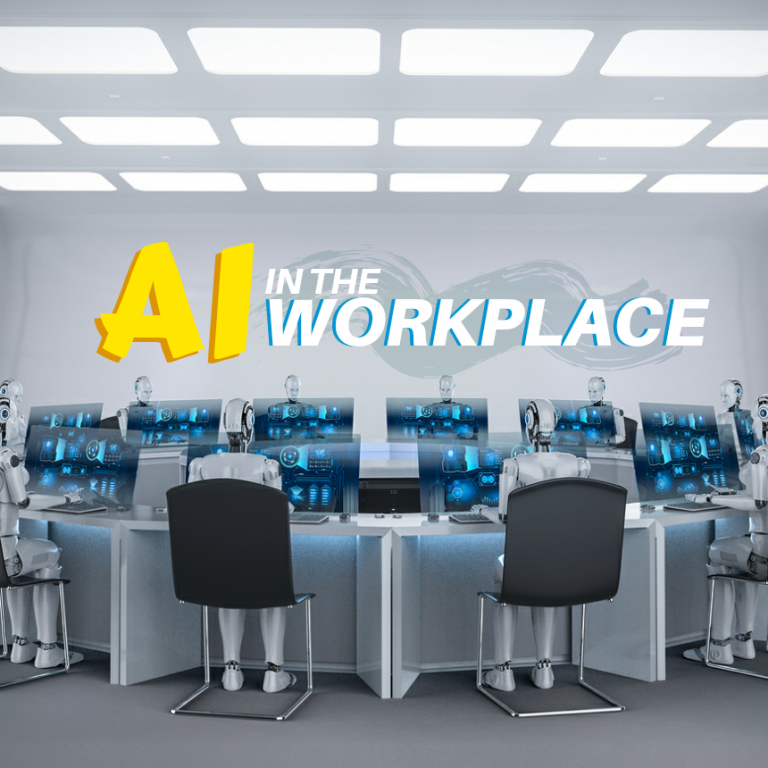
From platforms that provide product recommendations based on behavioral patterns of purchases to chatbots that answer basic FAQs, artificial intelligence (A.I.) applications have etched their mark on consumer experience in recent years. And now, AI is quickly advancing in the workplace, too. With AI technology advancing at a higher speed, there are now several ways that AI can be adopted to improve your daily lives. Streamlining processes such as hiring, administration, and data analysis can prove itself to be a helpful asset when it comes to lifting a workforce.
But, will AI replace or help human workers? To answer that question – AI does have its limits. While it might bring a little distress, what we’re witnessing today is a quick fix for enhancing work rate, an opportunity to positively keep the constant productivity, and ultimately, it allows you to manage routine business operations. If anything, AI is making business helping us by giving you some space and improving mental health in the workplace.
So, how can Artificial Intelligence help the workplace?
– Approximately 23% of businesses were estimated to have adopted AI into their processes, according to Forbes.
– In the next five years, the artificial intelligence market is approximated to grow by 50%, and regardless of business size, it can be used.
AI in Work Place: Why AI is considered as a valuable asset in the competitive business world
AI in Workplace – Facial recognition and video interviews
Several video interview platforms present on the market today mainly focus on scheduling a Q&A with an applicant, recording a clip of the conversation, and forwarding it to the HR team for final assessment.
– AI helps in screening candidates to the next level by combining facial analysis with AI.
– The software relies on 25,000 data points taken from the facial expressions, movements, and tone of voice.
The software takes the data from past successful candidates then uses them as a benchmark for screening new candidates. These subtle clues from their communication with the AI help determine their suitability to the role.
Artificial Intelligence in reducing unconscious bias in candidate interviews
Amid efforts to give rise to a more diverse workforce, businesses still struggle with the impact of unconscious bias in hiring. A Stockholm-based tech firm – Furhat Robotics works on reducing the impact of human bias on candidate screening with the help of the robotic interviewer named Tengai.
– The robot skips the small talk and walks candidates through the questions in the same manner, tone, and order.
– Many companies have believed this approach leads to a fairer recruitment process.
AI in the workplace – Augmented Reality
The growth in AI is also bringing up new opportunities in other sectors of emerging innovations closely linked with it, such as AR (Augmented Reality). This technology advancement can help a lot of people perform remote work effectively. During the coronavirus outbreak, an Indian startup’s remote technology helped Wuhan hospitals to set up air ventilation systems in the hospitals in Wuhan.
– BlinkIN technology – ‘Scotty,’ an artificial intelligence (AI) and augmented reality (AR)-powered live video calling system helped to bridge the connection between hospitals and product providers.
– The agent on the one side was able to users and guided them using augmented on-screen annotations and live pointers on their screen. – The technology seamlessly transport human skills and knowledge remotely where they are much
Related: ONPASSIVE: Building Tools for Future AI Applications
AI and decision making
HR managers who want to take a pulse of employee sentiment typically depend upon surveys with a quick Yes or No question rounds. But what happens when the inquiries related to complex issues such as workplace policy?
– This is where AI comes in. The AI platform enables users to collect free-text arguments – phrased in natural language.
– The software collects the user responsible for or against a topic then gives out the responses.
– Project Debater is one of that software that is essentially designed as a decision support tool for any business leaders who are willing to delve deeper into the insights and sentiments of the workforce they are hiring.
The implementation of AI seems inevitable, whether we like it or not. As businesses seek to welcome technology and automation, to avoid it could mean you’re left out of the game.
Those that have adopted AI into their workforce are reaping the rewards when it comes to speed, efficiency, and accuracy. At the heart of the matter, those jobs that were generally considered as time-consuming, resource-intensive or that needs more manpower, are now being converted to more reliable, more highly skilled positions.
Related: Pioneering Firms Aim for AI at Scale


